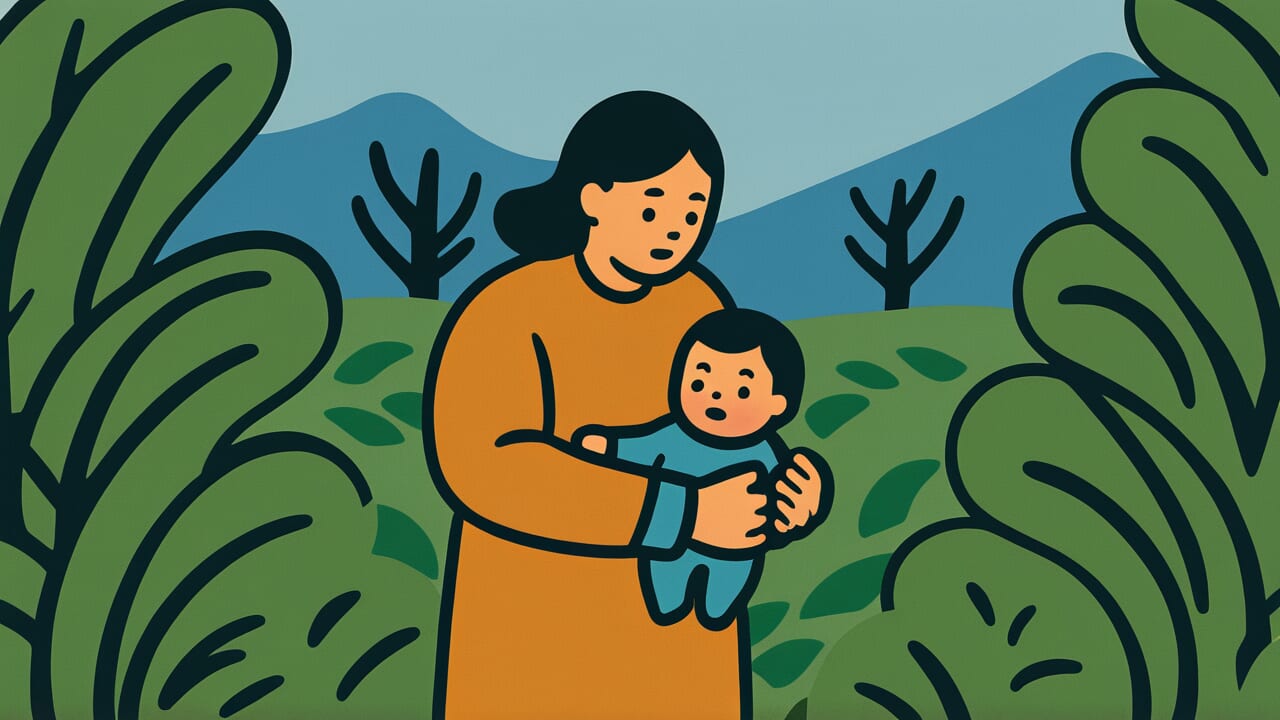How to Read “There are thickets to abandon children, but no thickets to abandon parents”
Ko wo suteru yabu wa aredo oya wo suteru yabu nashi
Meaning of “There are thickets to abandon children, but no thickets to abandon parents”
This proverb means that while parents may abandon their children, children never abandon their parents. It shows that the love from parent to child and the love from child to parent differ in their nature.
Parents may be forced to give up their children due to poverty or difficult circumstances. But children, no matter how poor or struggling they are, will never abandon their parents. This expresses a fundamental truth about human nature.
The proverb points out the asymmetry in parent-child affection. It’s used when praising a child’s deep love and devotion to their parents, or when teaching the importance of filial piety.
Modern society has seen the rise of nuclear families and changing parent-child relationships. Yet this proverb still conveys a universal truth. The depth of a child’s love for their parents remains unchanged.
Origin and Etymology
The exact first appearance of this proverb in literature is unclear. However, it was likely already spoken among common people during the Edo period.
The word “yabu” (thicket) provides a clue to the proverb’s origins. A thicket is an overgrown place where people can’t easily be seen.
In old Japan, abandoning children to reduce mouths to feed was a sad reality in poor families. Such acts would take place in hidden thickets, away from public view.
This proverb likely arose from observing human society. While parents might abandon children, the reverse never happens. The spread of Confucian ideas about filial piety in Japan also helped this proverb take root.
What’s interesting is that this isn’t just a moral teaching. It was born from calm observation of actual human behavior patterns.
The proverb acknowledges the harsh reality that parents sometimes give up children due to poverty or necessity. Yet it also recognizes that children never abandon their parents. This is human nature.
This saying contains the deep insight of our ancestors. They looked at both the light and shadow of human society.
Usage Examples
- No matter how poor I am, “there are thickets to abandon children, but no thickets to abandon parents,” so I must take care of my parents
- That person is so devoted to their parents. They truly embody “there are thickets to abandon children, but no thickets to abandon parents”
Universal Wisdom
The truth this proverb speaks is that human love has direction. A parent’s love for a child can sometimes become conditional.
Poverty, social pressure, and various circumstances can cloud a parent’s judgment. But a child’s love for their parents exists in a more unconditional and stronger form.
Why does this difference arise? It’s deeply connected to the human growth process.
Children are raised, protected, and shaped by their parents. Parents are the child’s entire world and the foundation of their survival. This primal bond is carved into the deepest part of a child’s heart and never disappears.
On the other hand, parents see their children as separate beings who are born from them. Though children are beloved, they can sometimes become burdens or subjects of difficult choices.
A parent’s love is deep, but it exists on top of their own sense of self.
This proverb has been passed down for so long because it perfectly captures this human essence. The depth and unwavering nature of a child’s love for their parents shows the beauty of human existence.
When AI Hears This
Biology has a concept called “reproductive value.” This quantifies how many offspring an individual can produce in the future. Younger individuals have higher values, while older ones have lower values.
For example, a 20-year-old and a 60-year-old differ vastly in how many children they can potentially have. From this perspective, this proverb shows a rational choice for genes.
Genes have one purpose: to pass copies of themselves to the next generation. Parents protect children because children carry half their genes. But here’s the crucial calculation: which should be prioritized?
Young children can reproduce for decades ahead, spreading genes through grandchildren and great-grandchildren. Meanwhile, elderly parents can no longer reproduce. From the gene’s viewpoint, protecting children is “high-return investment,” but protecting parents is “investment with no return.”
In fact, many animals show parents sacrificing themselves for offspring, but the reverse is almost never observed. Human society teaches “cherish your parents” through ethics and culture.
But perhaps we need to teach this so strongly precisely because it goes against biological instinct. This proverb might be evidence that our morality is actually fighting against natural law.
Lessons for Today
This proverb teaches us the importance of not forgetting the kindness we’ve received. Parents aren’t perfect. They sometimes make mistakes and may have hurt us.
But you exist here today because your parents raised you in some way.
In modern society, parent-child relationships often become distant. We’re busy and may put off spending time with our parents. But this proverb teaches that a child’s love for their parents is the essence of humanity.
Cherishing this love enriches your own humanity.
Filial piety doesn’t require anything special. A phone call, a short visit, small gestures of care. These small actions accumulate to support your parents and fulfill your own heart.
Caring for your parents is the first step in growing as a person and passing love to the next generation. Why not contact your parents today?



Comments